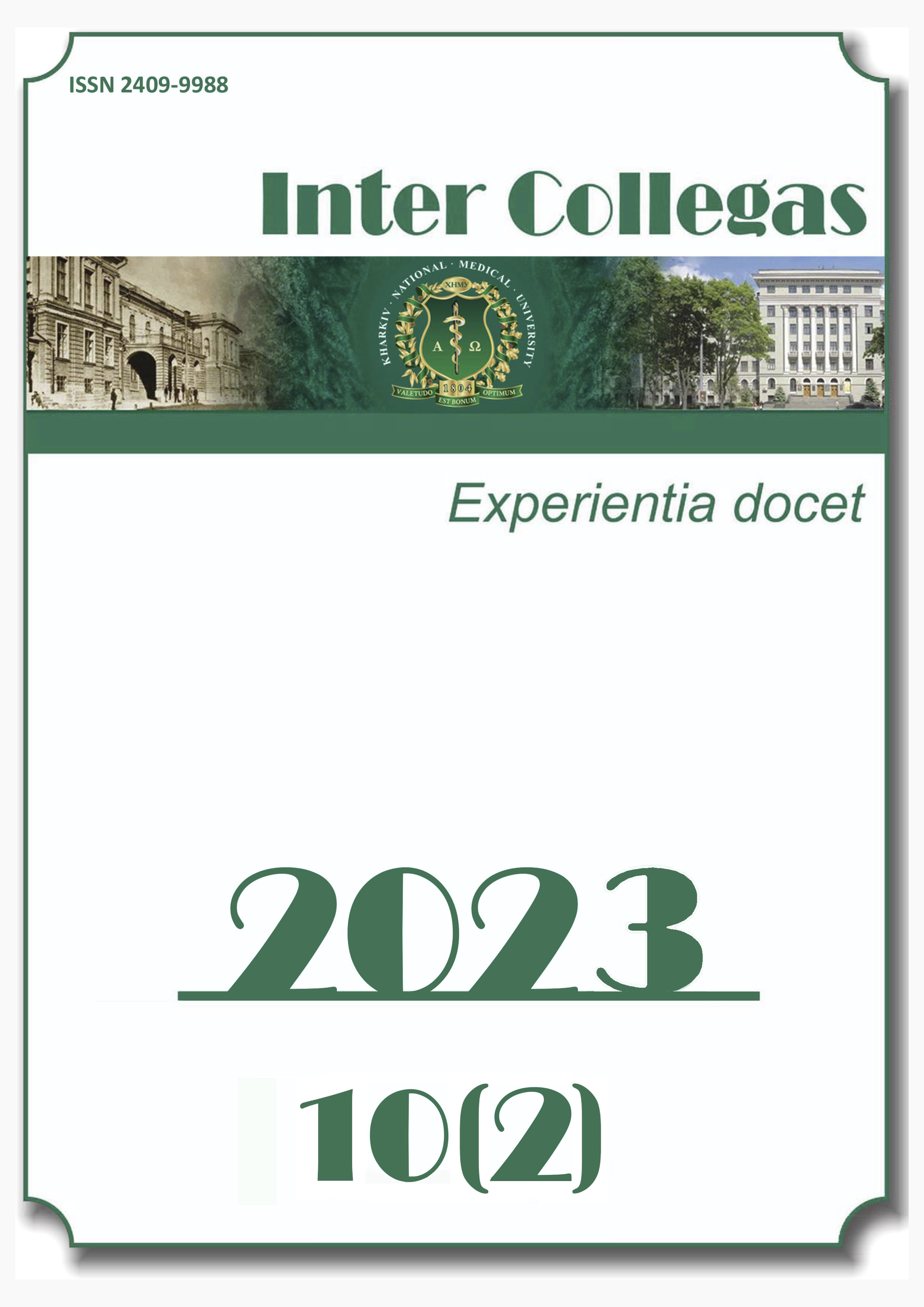Abstract
Background. The methodical article covers to problematic issues of higher education in general, and medical education in particular, as well as specialized teaching of biological and bioorganic chemistry in medical institutions of higher education, for students studying in the specialty "Pediatrics" and the importance of mastering the relevant skills and abilities taking into account the chosen specialization in the field of medicine.
The aim of the study was to analyze, systematize and develop general approaches to the further improvement of specialized educational materials in biological and bioorganic chemistry for level 2 (master’s degree) students majoring in specialty 228 "Pediatrics".
Materials and Methods. General scientific research methods, namely analysis and synthesis were used. Scientific literature, educational programs and normative documents of higher medical education were investigated. Bibliosemantic method and system analysis method were used.
Results. The issues of professional competence formation of future doctors studying under the educational and professional program (EPP) "Pediatrics" were considered, taking into account the age characteristics of metabolic processes and regulation of biochemical processes. The problems and relevance of the level of formation of the professional competence of teachers of medical institutions of higher education and its development in our time, taking into account the socio-economic and political situation and the ongoing russian aggression, were discussed. The effectiveness of the profiling process largely depends on the creation of optimal methods of learning, which include the preparation of profiled EPPs, work programs of educational disciplines and syllabuses created on their basis. Owing to the study of issues of age-related biochemistry, peculiarities of biochemical processes in childhood, students’ motivation to learn the educational material increases and a stable interest in the chosen profession is formed.
Conclusions. One of the tasks for the integration of the higher school into the European educational space is to increase the level of competence of pediatricians studying by EPP "Pediatrics" from the point of view of the teaching staff’s mastery of innovative teaching methods and readiness for their implementation in the pedagogical process due to profiling of various sciences for their more thorough study.
Keywords: specialized teaching, age biochemistry, pediatrics, quality of medical education.
References
Development strategy of the National Academy of Medical Sciences of Ukraine for the period until 2030. National Academy of Medical Sciences of Ukraine, 04 Jul 2022 [Internet]. Available at: http://amnu.gov.ua/strategiya-rozvytku-naczionalnoyi-akademiyi-medychnyh-nauk-ukrayiny-na-period-do-2030-roku/ [accessed 20 Oct 2023]. [In Ukranian].
Decree of the Cabinet of Ministers of Ukraine No.95-р on 27 Feb 2019 "On approval of the Strategy for the Development of Medical Education in Ukraine". In force on 20 Oct 2023. Verkhovna Rada (Parliament) of Ukraine. Legislation of Ukraine. Available at: https://zakon.rada.gov.ua/laws/show/95-2019-р [in Ukrainian].
Pavlenko SA, Pavlenkova OV, Sydorova AI, Lyashenko LI. The role of the teacher (NPP) in the formation of Soft Skills of the student of higher education. Bulletin of the problems of biology and medicine. 2021;3(161):209-11. DOI: 10.29254/2077-4214-2021-3-161-209-211. [In Ukrainian].
Pavlenkova OS, Kaskova LF, Amosova LI, Ulasevich LP, Kovalenko VS. The role of a higher school teacher in shaping the consciousness of a future doctor. Actual Problems of Modern Medicine: Bulletin of the Ukrainian Medical Stomatological Academy. 2023;23(2(82)):104-6. DOI: 10.31718/2077-1096.23.2.2.104. [In Ukrainian].
Hirnyk HYe. Pedagogical and communicative culture of a teacher of a higher medical institution as components of the pedagogical image. Archives of clinic medicine. 2015;1:61-3. Available at: http://nbuv.gov.ua/UJRN/akm_2015_1_21 [in Ukrainian].
The Standard of higher education of Ukraine of the second (master's) level of higher education in the field of knowledge 22 "Health care", specialty 222 "Medicine", approved by Order of the Ministry of Education and Science of Ukraine No.1197 on 8 Nov 2021. In force on 20 Oct 2023. Available at: http://surl.li/eyimk [in Ukranian].
Klishch HI. Reforming medical education in Austria: a successful case study and role model. Medical Education. 2011;1:58-65. DOI: 10.11603/me.v0i1.811. [In Ukranian].
Reitmeier MY. Integration of Ukraine into the European space of higher education. The main advantages and disadvantages. Part Two: Disadvantages. Galician medical journal. 2012;19(4):115-8. Available at: http://nbuv.gov.ua/UJRN/glv_2012_19_4_47 [in Ukranian].
Mykytenko AO, Omelchenko AE. The role of the student's research work in the training of medical personnel. South Ukrainian medical scientific journal. 2021;28:45-7. Available at: http://repository.pdmu.edu.ua/bitstream/123456789/20179/1/Osoblivosti_vikladannya.pdf [in Ukrainian].

This work is licensed under a Creative Commons Attribution-NonCommercial-ShareAlike 4.0 International License.


